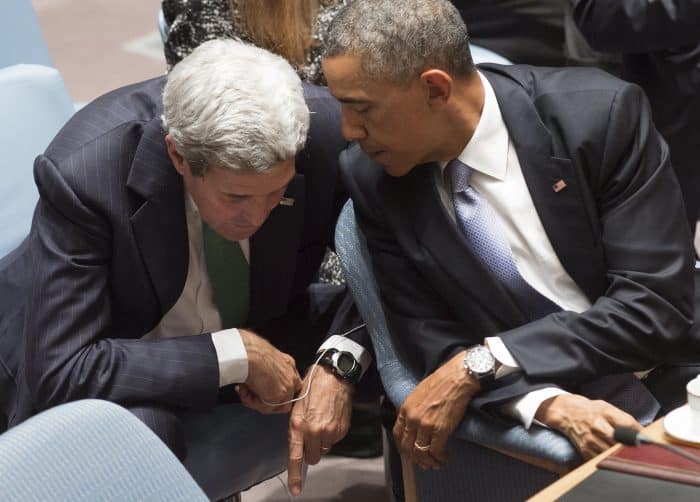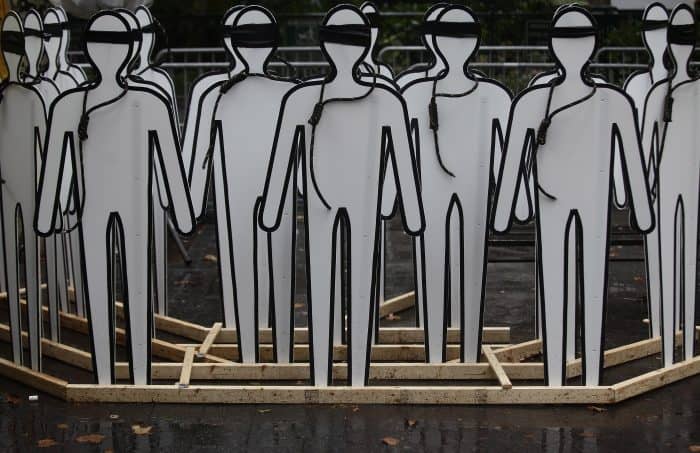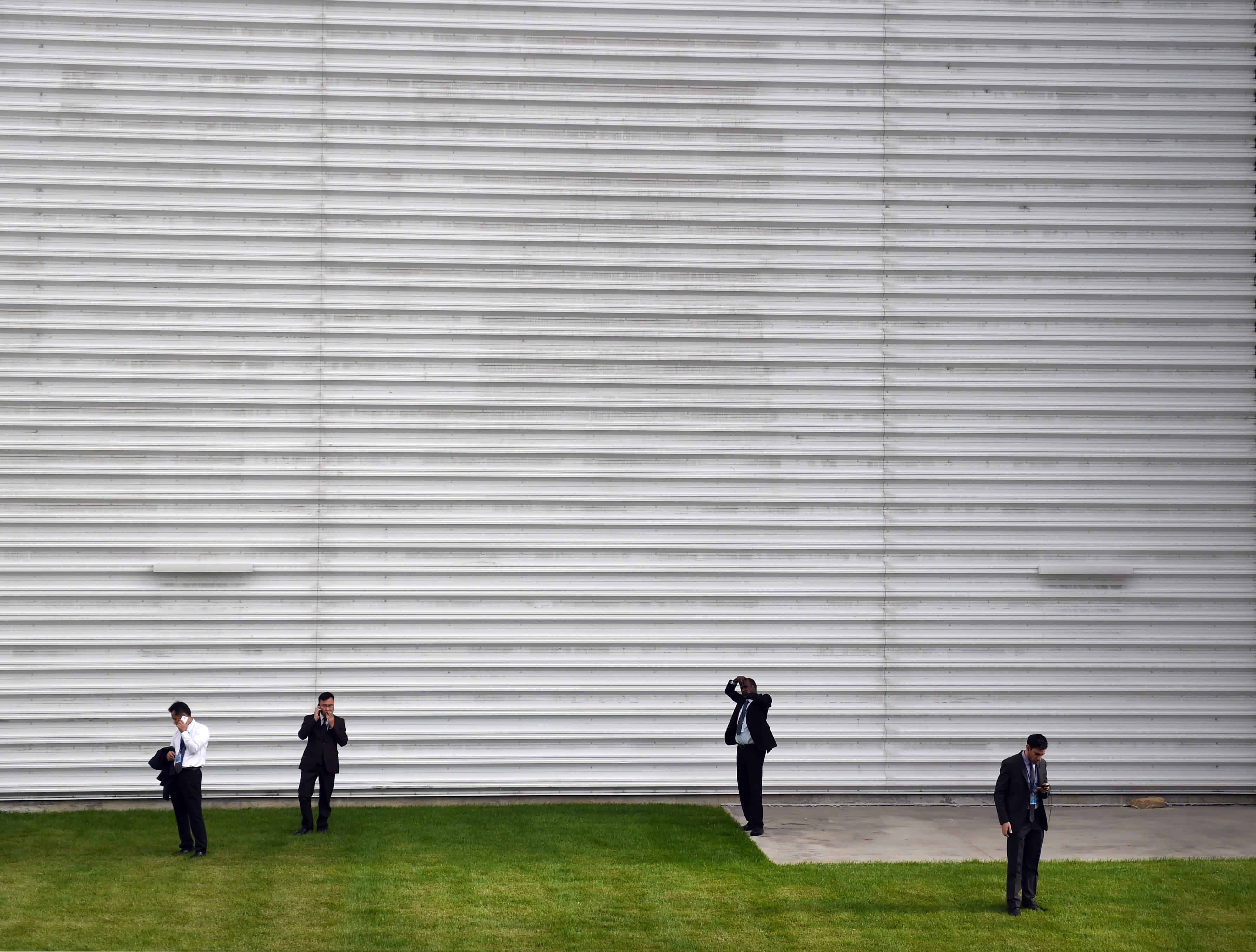UNITED NATIONS — Much like the schizophrenic reality of the annual meeting of the United Nations General Assembly itself, this week’s conclave of world leaders in New York has presented two contrasting narratives for the Syria-Iraq war and the current moment of upheaval in the Middle East. One, the polished speeches of leaders before the cameras, follows a script, presents its best face, and plays to the hopes of constituents back home. The other, like the snarling traffic jams, the curt, hurried back hall of conversations of the senior officials straining to do the diplomatic heavy lifting, and the late-night critiques offered up in hotel bars, is more ragged, grounded in the truth, and therefore unsettling.
The first, more polished, view is the story you would get if you listened only to presidents and foreign ministers speaking of clear goals, coalitions knit together by common ideals, and, ultimately, a remade, safer, more stable world. While the other view, the story you only hear in conversations that take place on background or off the record, reveals that even behind well-intentioned initiatives there can be the kind of delusions, dubious motivations, divisions, and duplicity that seem likely to make bad situations worse. The question now is what factors will tip the balance so that the story told (and sold) in press releases and talking points comes to pass — rather than the one that led a former cabinet official from U.S. President Barack Obama’s own party to say to me this week with regard to the White House’s recent conduct of foreign policy in the war-torn region, “Things are bad, very bad.”
The duality of this particular moment, the tension between the good and the terrible, is so stark it evokes the light-versus-darkness heart of the Zoroastrian philosophy of the Yazidi people who, once upon a time, so long ago it seems hard to remember, helped usher in this latest chapter of Mideast war. (Their crisis atop Mount Sinjar was only a month ago, in case you had forgotten.)
This tension was reflected in Obama’s remarks to the General Assembly when he said, “We come together at a crossroads between war and peace; between disorder and integration; between fear and hope.” As one of my colleagues, Elias Groll, indicated during his live-blogging of the speech for Foreign Policy, it’s a perspective that is far removed from Obama’s assertion of just 12 months earlier when he said, “The world is more stable than it was five years ago.”
What shocks and spasms we have seen in this past year or so: a United States that is about to take action in Syria, then one that could not without congressional approval and then later said maybe it didn’t need that approval after all; an administration arguing for the elimination of the standing authorization to use military force in Iraq and then just months later using it to justify an action it vowed it would never take; the United States hemming and hawing and disappointing allies from Eastern Europe to the Persian Gulf and then one acting boldly and celebrating the coalition with which it went to war. Who knew that the pivot the Obama administration would be remembered for was swiveling back to policies it opposed, rejected, and had turned away from just months or years before?

But if you listened to Obama’s passionate and well-delivered speech (and those of other leaders), you certainly could not help it if a bit of optimism brightened up your worldview. The president was powerful and clear about issues on which in the past he had been accused of hesitancy and vagueness. He was tough on IS and extremism, saying, “No God condones this terror. No grievance justifies these actions. There can be no reasoning, no negotiation, with this brand of evil.” He took on Russian President Vladimir Putin, promised aid to combat Ebola, and to fight climate change. He was encouraging on the Iran nuclear talks and even took a moment to reflect on America’s own flaws as manifest in the shooting and subsequent unrest in Ferguson, Missouri. In closing, he offered a resoluteness many have long hoped for from this administration: “At this crossroads, I can promise you that the United States of America will not be distracted or deterred from what must be done. We are heirs to a proud legacy of freedom, and we’re prepared to do what is necessary to secure that legacy for generations to come.”
Obama was not the only one promising a more positive view and hinting at a different shape of things to come. At a small breakfast for journalists, Iranian President Hassan Rouhani openly and deftly fielded questions on a wide range of subjects. While reports of the meeting emphasized his critique of the U.S. attacks on Syria as illegal, the real headline of the meeting was how little he mentioned those attacks. He commented on them pro forma, for a split second, then moved on to describe his hopes for U.S.-Iran nuclear talks. He said this week would be pivotal in those talks and that he hoped for a final deal before the current round’s deadline, which is approaching in just two months. He mentioned that a year ago in his phone conversation with Obama the two discussed how such a deal could usher in new communication and cooperation between the United States and Iran. He talked of rapprochement with regional neighbors despite enduring differences. He refused to be baited into focusing on U.S.-Iranian tensions on key issues.
On Syria, Rouhani said the focus should be on “time-management skills,” meaning first defeating terrorists and then addressing a political solution — and when he mentioned the political solution he didn’t mention Syria’s president and erstwhile ally Bashar Assad by name. The vibe he gave off was that Iran might be open to a deal that saw Assad depart, provided all the people of Syria had a say (meaning that non-Sunni minorities might be able to form a coalition to keep the government out of Sunni hands). He even said that even if the deal he hoped for did not materialize there would be other ways to carry the dialogue forward. And this, too, was a far cry from a year earlier, when the big story was whether or not there would be the possibility of a handshake or a photo op between U.S. and Iranian leaders. Now there was an emphasis on a possible sea change, on the common goal of fighting terror.
Taken with Obama’s remarks and those of other regional leaders, Rouhani’s comments seemed to suggest that a materially different Middle East was a possibility.
No longer would the United States be acting alone trying to solve problems far from home. Burdens of combatting threats would be shared among local nations. The U.S.-Iran enmity that had been a defining factor in regional relations for decades might be ebbing. A nuclear deal might be in the offing. If there was not a complete transformation around the corner, perhaps pockets of material progress could lead to other areas of thaw — Rouhani mentioned economics, trade, combatting terror, and promoting regional stability. Groups like IS would not stand a chance against such resolve. Pluralism, instead of institutionalized sectarian bullying, would be promoted in places like Iraq. The Mideast would be safer, more secure, and more self-sufficient. America would be able to better address problems at home while leading with a lighter touch. Obama even suggested that the status quo would have to change for Gaza and the West Bank.
But offstage, the discussions about all these issues had a dramatically different tone. It was doubtful and largely pessimistic.

When Obama spoke of dismantling IS’s “network of death,” regional diplomats worried anew that he was overly focused on one terrorist group when they saw the problem as rapidly spreading violent extremism, a threat not just in Iraq and Syria but stretching from Mali to Nigeria to the Horn of Africa, from Libya to Egypt to Gaza to Syria and Iraq, from the Gulf to Afghanistan, Pakistan to China. They worried the U.S. president who was touting his own progress combatting al-Qaida had failed to realize that in overly focusing on one group he opened the door to a spread and proliferation of terror threats that made extremism far more prevalent and dangerous today than at any time in history. Obama spoke of tackling extremism but described it as a generational threat that the people of the region or “the civilized peoples of this world” must combat over time. To one listener from a country burdened by refugees from the war in Syria, this was “a sign that he thought this was too big a problem to deal with, that he was pushing it off into the future.” Another Arab diplomat said to me, “The president is trying to win by defining the problem as narrowly as possible. It makes it more manageable.” His point: IS is a big threat. We should be trying to destroy them, but to do that without addressing the bigger problem would be to repeat the mistake of overly focusing on core al-Qaida.
Another concern buzzed about by senior diplomats is that the focus is on military action and on cutting off funds to the militants — which are essential — but there is very little confidence that what needs to be done to create a viable political solution in Iraq is going to happen. The new government is too much like the old. There is still no defense or interior minister. There is no confidence that anyone senior in the U.S. government will create the kind of real, quid pro quo, pay-as-you-go pressure on the Iraqis that the United States will help beat back the IS threat but only will keep doing it if real material progress in giving the Sunnis the voice they deserve happens. “Military victory creates a void,” I was told. “It has to be filled by something. If it is not a new political reality for Sunnis, we’ll solve nothing.”
Recommended: Solís sidesteps Nicaragua border dispute in UN address
Another area of worry is the fragility of the coalition. The number of coalition planes in the first Syria attack was relatively small — about a dozen and a half. Some members of the coalition snickered at the Qatari failure to actually deliver any ordinance during the attack. The joke was that they were afraid to blow up anything they might have previously paid for. In the longer term, there is a concern that if the United States is too narrowly focused on IS and won’t help with other perceived threats or won’t get tough enough with coalition members that are funding extremists, that this could fragment the coalition. So, too, could an Iran nuclear deal that appeared too soft or too much rapprochement between the United States and the Iranians at the seeming expense of relations with Gulf states.
Further concerns centered on the viability of the coalition efforts. Weeks of bombing in Iraq had a relatively limited impact on IS. And the absence of a commitment to ground troops from any members of the coalition is seen as a huge weakness. Not only are ground troops required to hold land taken and keep it secure, but if the only ground troops are Iraqis taking advice from Iran, there is no certainty as to what they will do with the gains or whether local Sunnis will even see that as a victory. Similarly in Syria, bombing IS only opens the way for the Assad regime, the rightly reviled killers of 200,000, to grow ever stronger. (Among the regional diplomats with whom I spoke, this was seen as almost inevitable, as was Assad’s remaining in power for quite some time to come.) Other issues — possible Saudi succession issues, the vulnerability of Jordan, how Israel might react to an Iran deal, what might happen with Iran if the U.S. Congress scuttles a possible deal or seeks additional sanctions and how that might impact the tacit collaboration between the two countries in fighting IS, the potential of coming problems in Afghanistan or a further meltdown in Libya to add to the distractions, and the perceived untrustworthiness of coalition partners like Turkey and Qatar — also were mentioned in four days of conversations here about this.
In short, if well-turned phrases defined history’s outcomes, we might be heading to a much better, safer Middle East. But if the men and women who are working behind the scenes to make that happen are to be believed, it is even more likely that further unrest and danger are on the horizon. We may enjoy early victories in the war against IS, we may even turn them back in the months ahead, but absent a commitment to address the broader, strategic issues with the same sense of urgency we are bringing to that fight — to battle for political gains as intently as we do those on the battlefield, or for leaders like Obama and Rouhani to devote as much of their attention to the work of the back room as they do to that at the podium — it looks like in the current Middle East there may be, in the famous words of the old song by Creedence Clearwater Revival, a bad moon rising.
Rothkopf is CEO and editor of the FP Group. His next book, “National Insecurity: American Leadership in an Age of Fear” is scheduled to be released Oct. 28.
© 2014, Foreign Policy






